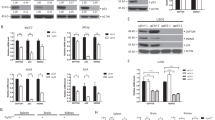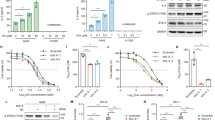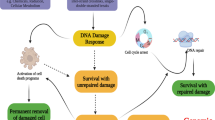Abstract
p73, a member of the p53 family, can induce apoptosis in cancer cells. Since p53-mediated apoptosis can be augmented by various cancer chemotherapeutic agents, it has been hypothesized that the status of the endogenous p53 gene in cancer cells is a key determinant in the outcome of cancer therapy. To determine whether p73 can sensitize cancer cells to apoptosis by DNA damage agents, several MCF7 adenocarcinoma cell lines that inducibly express p73 or p53 under a tetracycline-regulated promoter were generated. We found that at relevant physiological levels, p73, but not p53, is capable of sensitizing MCF7 cells to apoptosis induced by chemotherapeutic agents. In addition, we found that p73 can cooperate with the DNA damaging agent camptothecin to activate the initiator caspase 2. Furthermore, we found that p73 can cooperate with DNA damaging agents or p53 to induce some p53 target genes and activate their promoters. In contrast, in MCF7E6 cells that ectopically express the human papillomavirus E6 oncogene and are functionally p53-null, the ability of p73 to sensitize cells to apoptosis is abrogated. Taken together, these results suggest that a functional interaction between p53 and p73 in MCF7 cells leads to enhanced induction of apoptosis.
This is a preview of subscription content, access via your institution
Access options
Subscribe to this journal
Receive 50 print issues and online access
$259.00 per year
only $5.18 per issue
Buy this article
- Purchase on Springer Link
- Instant access to full article PDF
Prices may be subject to local taxes which are calculated during checkout






Similar content being viewed by others
References
Agami R, Blandino G, Oren M, Shaul Y . 1999 Nature 399: 809–813
Agarwal ML, Taylor WR, Chernov MV, Chernova OB, Stark GR . 1998 J. Biol. Chem. 273: 1–4
Chen X . 1999 Mol. Med. Today 5: 387–392
Chen X, Bargonetti J, Prives C . 1995 Cancer Res. 55: 4257–4263
Chen X, Ko LJ, Jayaraman L, Prives C . 1996 Genes Dev. 10: 2438–2451
Chresta CM, Masters JR, Hickman JA . 1996 Cancer Res. 56: 1834–1841
De Laurenzi V, Costanzo A, Barcaroli D, Terrinoni A, Falco M, Annicchiarico-Petruzzelli M, Levrero M, Melino G . 1998 J. Exp. Med. 188: 1763–1768
Di Como CJ, Gaiddon C, Prives C . 1999 Mol. Cell. Biol. 19: 1438–1449
Fan S, Smith ML, Rivet II. DJ, Duba D, Zhan Q, Kohn KW, Fornace Jr. AJ, O'Connor PM . 1995 Cancer Res. 55: 1649–1654
Friedlander P, Haupt Y, Prives C, Oren M . 1996 Mol. Cell. Biol. 16: 4961–4971
Gallardo D, Drazan KE, McBride WH . 1996 Cancer Res. 56: 4891–4893
Giaccia AJ, Kastan MB . 1998 Genes Dev. 12: 2973–2983
Gong JG, Costanzo A, Yang HQ, Melino G, Kaelin Jr WG, Levrero M, Wang JY . 1999 Nature 399: 806–809
Gupta M, Fan S, Zhan Q, Kohn KW, O'Connor PM, Pommier Y . 1997 Clin. Cancer Res. 3: 1653–1660
Hermeking H, Lengauer C, Polyak K, He T-C, Zhang L, Thiagalingam S, Kinzler KW, Vogelstein B . 1997 Mol. Cell. 1: 3–11
Ichimiya S, Nimura Y, Kageyama H, Takada N, Sunahara M, Shishikura T, Nakamura Y, Sakiyama S, Seki N, Ohira M, Kaneko Y, McKeon F, Caput D, Nakagawara A . 1999 Oncogene 18: 1061–1066
Jost CA, Marin MC, Kaelin Jr WG . 1997 Nature 389: 191–194
Kaelin Jr WG . 1999a J. Natl. Cancer Inst. 91: 594–598
Kaelin Jr WG . 1999b Oncogene 18: 7701–7705
Kaghad M, Bonnet H, Yang A, Creancier L, Biscan JC, Valent A, Minty A, Chalon P, Lelias JM, Dumont X, Ferrara P, McKeon F, Caput D . 1997 Cell 90: 809–819
Ko LJ, Prives C . 1996 Genes. Dev. 10: 1054–1072
Laurenzi VD, Catani M, Costanzo A, Terrinoni A, Corazzari M, Levrero M, Knight R, Melino G . 1999 Cell. Death Differ. 6: 389–390
Lee JM, Bernstein A . 1993 Proc. Natl. Acad. Sci. USA 90: 5742–5746
Levine AJ . 1997 Cell 88: 323–331
Lowe SW, Bodis S, McClatchey A, Remington L, Ruley HE, Fisher DE, Housman DE, Jacks T . 1994 Science 266: 807–810
Lowe SW, Ruley HE, Jacks T, Housman DE . 1993 Cell 74: 957–967
Marin MC, Jost CA, Brooks LA, Irwin MS, O'Nions J, Tidy JA, James N, McGregor JM, Harwood CA, Yulug IG, Vousden KH, Allday MJ, Gusterson B, Ikawa S, Hinds PW, Crook T, Kaelin Jr WG . 2000 Nat. Genet. 25: 47–54
Marin MC, Jost CA, Irwin MS, DeCaprio JA, Caput D, Kaelin Jr WG . 1998 Mol. Cell. Biol. 18: 6316–6324
Morgenstern JP, Land H . 1990 Nucleic Acids Res. 18: 3587–3596
Moustakas A, Kardassis D . 1998 Proc. Natl. Acad. Sci. USA 95: 6733–6738
Mukhopadhyay T, Roth JA . 1997 Oncogene 14: 379–384
Munger K, Phelps WC, Bubb V, Howley PM, Schlegel R . 1989 J. Virol. 63: 4417–4421
Nagata S . 2000 Exp. Cell. Res. 256: 12–18
O'Connor PM, Jackman J, Bae I, Myers TG, Fan S, Mutoh M, Scudiero DA, Monks A, Sausville EA, Weinstein JN, Friend S, Fornace Jr AJ, Kohn KW . 1997 Cancer Res. 57: 4285–4300
Prives C, Hall PA . 1999 J. Pathol. 187: 112–126
Resnick-Silverman L, St Clair S, Maurer M, Zhao K, Manfredi JJ . 1998 Genes Dev. 12: 2102–2107
Wang Y, Blandino G, Oren M, Givol D . 1998 Oncogene 17: 1923–1930
Weinstein JN, Myers TG, O'Connor PM, Friend SH, Fornace Jr AJ, Kohn KW, Fojo T, Bates SE, Rubinstein LV, Anderson NL, Buolamwini JK, van Osdol WW, Monks AP, Scudiero DA, Sausville EA, Zaharevitz DW, Bunow B, Viswanadhan VN, Johnson GS, Wittes RE, Paull KD . 1997 Science 275: 343–349
Xiao H, Hasegawa T, Isobe K . 1999 J. Cell. Biochem. 73: 291–302
Yang A, McKeon F . 2000 Nature Rev. Mol. Cell. Biol. 1: 199–207
Yu J, Zhang L, Hwang PM, Rago C, Kinzler KW, Vogelstein B . 1999 Proc. Natl. Acad. Sci. USA 96: 14517–14522
Yuan ZM, Shioya H, Ishiko T, Sun X, Gu J, Huang YY, Lu H, Kharbanda S, Weichselbaum R, Kufe D . 1999 Nature 399: 814–817
Zaika AI, Kovalev S, Marchenko ND, Moll UM . 1999 Cancer Res. 59: 3257–3263
Zhu J, Jiang J, Zhou W, Chen X . 1998a Cancer Res. 58: 5061–5065
Zhu J, Zhang S, Jiang J, Chen X . 2000 J. Biol. Chem. 275: 39927–39934
Zhu J, Zhou W, Jiang J, Chen X . 1998b J. Biol. Chem. 273: 13030–13036
Acknowledgements
We are grateful to Rhea Markowitz for critical reading of this manuscript. We would like to thank William Kaelin, Jr for providing simian p73 cDNAs. This work is supported in part by Grant RO1 CA81237 from the National Institutes of Health and Grant DAMD 17-97-1-7019 from the DOD Breast Cancer Research Program.
Author information
Authors and Affiliations
Corresponding author
Rights and permissions
About this article
Cite this article
Zhu, J., Nozell, S., Wang, J. et al. p73 cooperates with DNA damage agents to induce apoptosis in MCF7 cells in a p53-dependent manner. Oncogene 20, 4050–4057 (2001). https://doi.org/10.1038/sj.onc.1204516
Received:
Revised:
Accepted:
Published:
Issue Date:
DOI: https://doi.org/10.1038/sj.onc.1204516
Keywords
This article is cited by
-
αNAC inhibition of the FADD-JNK axis plays anti-apoptotic role in multiple cancer cells
Cell Death & Disease (2014)
-
Methylation of the p73 gene in patients with myelodysplastic syndromes: correlations with apoptosis and prognosis
Tumor Biology (2013)
-
α-TEA cooperates with chemotherapeutic agents to induce apoptosis of p53 mutant, triple-negative human breast cancer cells via activating p73
Breast Cancer Research (2011)
-
Regulating the genome surveillance system: miRNAs and the p53 super family
Apoptosis (2010)
-
Study on relationship between chemosensitivity of breast cancer and expression of p73α and p53
Chinese Journal of Cancer Research (2005)



